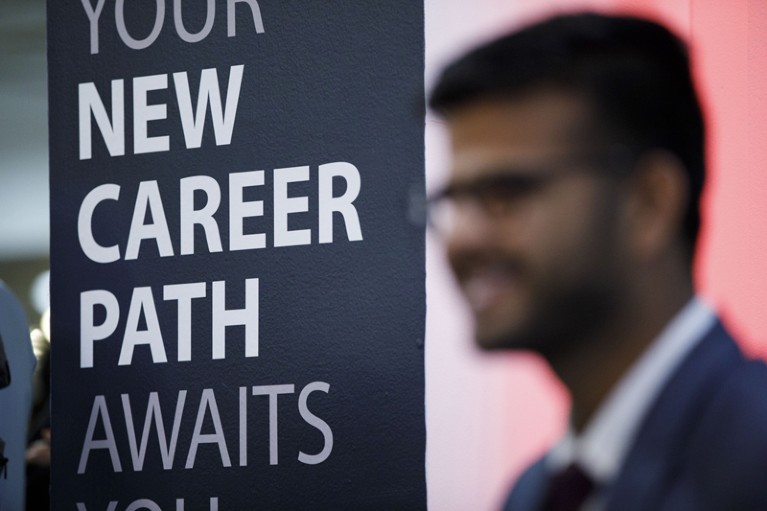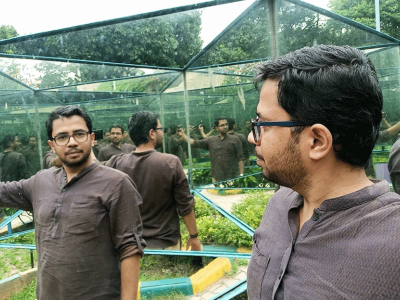

Scientists say they’re finding it increasingly difficult to find a new roles, but there are ways to boost the chances of job applications.Credit: Patrick T. Fallon/Bloomberg via Getty
Challenging economic circumstances are affecting scientists’ job searches, with greater competition for limited posts. Nature’s first global survey of postdoctoral researchers revealed that many of the respondents — 70% of those in Europe and 64% of those in Australasia — are dissatisfied with their level of job security.
Budget-minded organizations are scaling back their resources for recruiting and hiring scientists. Meanwhile, inflationary pressures can make professionals feel discouraged and desperate to secure a role, leading them to take jobs that might not be the right fit.
But the challenge of finding the right job can be overcome. And it begins with developing an awareness of existing obstacles. Scientists can then use time-tested strategies to stand out from other candidates and to land job offers.
Shifting sands
Briana Konnick, director of career development at the Pritzker School of Molecular Engineering at the University of Chicago in Illinois, has seen at first hand how recruitment is changing. “Half of my role is employer engagement,” says Konnick, who helps graduate students and postdoctoral researchers with their job searches. “Recruitment budgets for these companies have been completely demolished,” she says.
For instance, in autumn 2023 she learnt that a large pharmaceutical company had “decreased their entire talent-acquisition team to three people for the whole globe, which is just bonkers”, Konnick says. Companies are slashing their on-campus recruitment efforts, she says. Instead, they now direct candidates to peruse their websites to work out whether they’re interested in working for the company, rather than getting that information from interacting more directly at recruitment events.
Promotion pathways: how scientists can chart their industry career trajectory
Competition for jobs is mounting. According to a September 2023 report from the consultancy organization the Institute for Employment Studies in Brighton, UK, labour-market data in the United Kingdom showed “employment falling sharply, a similarly large rise in unemployment, and an uptick in economic inactivity”. It also reported a 20% drop in job vacancies since September 2022.
Scientists are already starting to feel the squeeze of a challenging labour market. Josh Henkin is a career coach and founder of STEM Career Services in Arlington, Virginia, which helps people with a background in science, technology, engineering or mathematics (STEM) to build careers outside academia. Henkin knows of a cell-gene-therapy company that received ten CVs for a position of chief operating officer. “That’s a lot of resumes for that type of position,” he says. “For their entry-level positions, there will be hundreds of candidates.”
Job seekers also need to be aware of how their unique circumstances might hamper their prospects in a difficult market. Nature asked career specialists how scientists can make themselves particularly employable and stand out in an increasingly competitive market.
Remove ‘limiting beliefs’
For Amani Said, a career coach based in Malaga, Spain, who works with scientists, the process of helping a client to excel in their job search often begins with some personal-development work. Said tries to get scientists to identify and then reduce or eliminate negative views that might be holding them back.
People often feel as if they’re the only ones experiencing self-doubt or apprehension. But Said explains how most people have the same feelings. When 16 scientists were asked to anonymously report what Said calls limiting beliefs at a workshop in Norway, they gave responses such as “I can’t do it”, “I don’t have the energy”, “I’m not creative”, “I’m not really sure what I want”, “People don’t like me”, and “I’m not good enough”. There were 113 such responses.
“As soon as you just talk about it more openly, you can remove the stigma around this feeling that you have to feel that you’re perfect,” Said says. Banishing that damaging belief is “definitely the number one obstacle”, she adds.
Managing one’s expectations is also key to a successful job hunt, Konnick says. She estimates that the average job search currently takes around three to six months, so people should prepare themselves for a long road.
“It can be incredibly discouraging and disheartening,” she says. But those struggles can be lessened if job seekers connect with supportive people.
As time passes, candidates can quickly begin to feel desperate. They should fight this feeling. “People can smell desperation, even over e-mail or through contacts on LinkedIn,” says Jim Gould, director of the Office of Postdoctoral Fellows at Harvard Medical School and the Harvard School of Dental Medicine in Boston, Massachusetts. Instead, “be confident in your work and curious on the next steps”. Perhaps more importantly, desperation can lead candidates to prematurely lower their standards for the type of job or company culture they are willing to accept. This can land them a job that they will ultimately be unhappy with, Said says. Once the relief of having a new job passes, people might realize their discontent and find themselves right back where they started: on the job market.
Gould likes to draw an analogy between scientific research and the job-search process. “The first step of the scientific method is question and gather information,” he says. “If you’re asking good questions and gathering information, the rest of the experimental design is going to go well.”
Identifying your strengths
It’s common for scientists to struggle with overcoming the “cringe factor associated with self-promotion”, says Lakshmi Ramachandran, a career and professional-development coach in Singapore and co-founder of Enoughness Mindset Coaching and Training, because they often think that their work should speak for itself.
“Many people who have science degrees don’t understand the business side of things,” Henkin says. “Part of my work as a coach is to help people understand that they are actually a product that a company is buying, in a way,” he adds. Through this lens, job seekers can see that employers have a problem — job vacancies — and “the candidate is the solution to the company’s problem”, Henkin says. “If you view yourself in that manner, it may help you understand the job-search process a little bit differently.”
Demonstrating your uniqueness and how that aligns with a prospective employer’s needs and company culture “is where competition can actually become obsolete”, Said says. She recommends that job seekers use the STAR (situation, task, action, result) method as a starting point for identifying their unique traits. This involves dissecting a situation that has occurred in the past and identifying what tasks had to be done, what actions the job seeker took and the results. She notes that looking at “some of the things I do with ease” is often a good starting point for candidates.
Boomerang academics: why we left academia for industry, but then came back
Sometimes even something that a job seeker sees as a weakness is a remarkable strength in disguise. One client told Said “I don’t know what’s unique about me. I’m actually just lazy.” But when she asked him to explain what he meant, his answer revealed a completely different story.
That scientist didn’t know how to program a computer but “had a manual task in the lab where he had to analyse huge amounts of data”, Said says. “He didn’t really like that; it was super boring,” she notes. But when lockdown restrictions as a result of the COVID-19 pandemic meant that he couldn’t go into the laboratory, he used the time he would have spent in the lab teaching himself how to program.
Eventually, Said says, the scientist devised an algorithm that was efficient enough to speed up the data-analysis process considerably. Tasks that previously took four hours could now be completed in just four seconds.
For that scientist, demonstrating his capacity to increase productivity and lighten employee workloads is a tremendous asset to capitalize on in the job search. But engaging in a self-discovery and reflection process was key to him realizing that.
Targeting the job search
Many job seekers prematurely take themselves out of the running for jobs simply by assuming that if they don’t meet all the criteria listed in a job advertisement, then they needn’t apply. However, candidates should bear in mind that employers usually know that the person they hire won’t have everything they’re asking for. Henkin and Konnick both compare those long lists of qualifications to hunting for a unicorn.
By learning how to decipher which of the desired qualifications are most important, scientists can better gauge whether or not to apply for an opening. “Primacy does matter,” meaning desired skills and attributes are often listed in descending order of importance, Konnick says.
Therefore, missing one of the first qualifications listed might pose a problem. However, missing a few requested competencies from the bottom of the list might not be a dealbreaker, Konnick says. Candidates are likely to be considered for a job if they have about 75% of the items on an employer’s wish list, she says.
If a keyword such as bioinformatics scientist “is literally in the title of the job”, candidates “are absolutely going to need to have those attributes, skills [or] competencies” to succeed, Konnick says. In addition, when keywords are repeated in the advert, that usually signifies that they’re of higher importance, Konnick notes. To help pinpoint key terms, she recommends “just copy–pasting the text of the job ad into a word cloud” generator.
How to market yourself
There are striking similarities between job hunting and dating, according to Henkin and Said. For both, people need to communicate their interest in the other party. They also need to appear enthusiastic and well-informed without seeming desperate or obsessive. Furthermore, they must know their strengths without appearing self-obsessed.
Building and bolstering your network is a foundational part of job hunting.
“Reach out. Just tell people what you’re doing and invite them along with you for the journey,” says Gould.
“You’re not asking people for jobs. You’re asking them for information and contacts and referrals,” Gould says. This approach leads to “de-escalating the nasty word of ‘networking’ and just making it ‘relationship building,’” he notes.
“That’s half the battle [to] finding jobs when you’re in a job market that might be slow,” Gould says. “It’s a personal connection that might get you around the application process. It’s someone else who knows someone else who can put your materials in front of the hiring manager,” he says.
How to switch research fields successfully
But job seekers shouldn’t “spam people with their CVs”, Said says. She notes that many people send her their materials on LinkedIn without taking the time to form a relationship first. “Why should I sit and look at your CV when I still don’t even know you?” she asks. Instead, the goal is to create genuine connections.
“Be mindful and respectful of other peoples’ time,” Said says. She encourages people to use the networking process to demonstrate how they can add value to companies by asking the people with whom they interact about existing struggles that they could help with.
Konnick recommends that job seekers tap into their university alumni networks, even if they aren’t students or recent graduates. Attending alumni events can help job seekers to identify “the pathways available” to them, she notes. It is better to target your approach here as well.
“There’s this phrase of ‘throwing spaghetti at the wall and seeing what sticks’. I think that’s a terrible strategy,” Konnick says.
Job applicants should avoid “submitting applications in haste without really going through the job description and adapting their resume to match”, Ramachandran says. CVs shouldn’t be a rambling, drab list “of all the things that I do in my current role, and what I’ve done in my previous roles”, Henkin says. Instead, he recommends that candidates focus on conveying three points: “The skills you possess, evidence that you’re successful at those skills” and “why you’re successful”.
“What you don’t want to be doing is drafting application materials without having someone else review them for content, for context, for spelling typos,” Gould says. That person could be a trusted friend, a mentor or a career professional. They can also evaluate whether an application is clear and concise.
Henkin encourages candidates to consider “the risk equation that companies go through” when evaluating applicants. One major risk is that the person they hire will lack the skills needed to succeed at the job. Another is that they will hire someone and train that person, only for them to leave the company soon after. When a candidate demonstrates their aptitude, commitment and integrity, it can help to alleviate those concerns.
Source link







